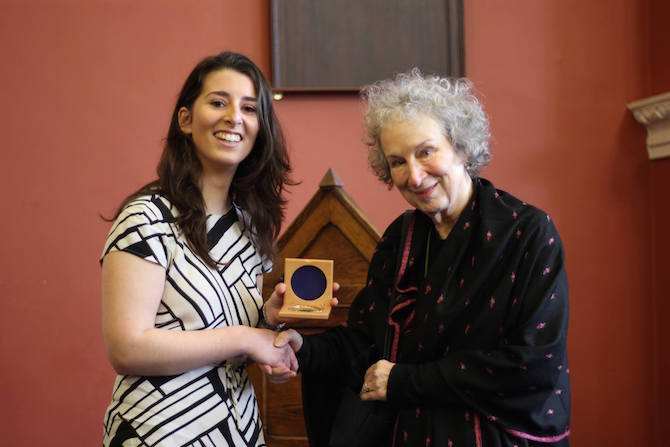
Atwood kept the crowd well entertained with her dry humour and wit. She opened with a comparison of members of the Phil to vampires, as Sheridan Le Fenu’s Carmilla, and Bram Stoker’s Dracula are pieces of Irish literature featuring vampires. Maybe, Atwood observed, the world’s oldest debating society also has the world’s oldest students.
After a lighthearted opening, she quickly moved onto her life as a writer. She described writing as a “dodgy profession.” There is no pension plan, no retirement, and if you say you wish to be a writer at school your parents may have “renal failure,” she joked.
In both writing and acting, people pretend and lie, suspend disbelief, and in doing so may be granted insight into themselves, she said. Atwood also commented that rejection in acting takes place very publicly, whereas in writing it is normally behind closed doors at meetings.
Even though it is a “dodgy” profession, Atwood remarked upon the increasing popularity of creative writing courses and the creative writing schools that are popping up.
She did not think that the death of the novel and paper books will come to pass. In spite of the rise of ebooks and so forth, the novel and the “narrative impulse” is still very much alive according to Atwood.
Atwood also delved into the history of storytelling. She emphasised the inherent, natural nature of storytelling. The ability to follow a plot, to understand sequences of events in a kind of story, is part of the “human toolkit.” It must have been advantageous for our ancestors to tell stories, as it helped us to explain to future generations how to survive and prosper, and that storytelling DNA would have been passed on, she commented.
Atwood outlined her view that we are all constantly working on and revising a story – the story of our lives. As far as Atwood is concerned, everyone is a storyteller, but writers just tell them professionally.
She went on to give details of her upcoming project, called Catbird, a graphic novel which will become a series, illustrated by Johnnie Christmas. It will be published in August, and features a superhero with the powers of both cat and bird. This is a significant choice of animal power, as Atwood is an active animal and environmental campaigner. The novel is partly to raise awareness of the Keep Cats Safe and Save Bird Lives campaign in Canada, as many birds die due to unsupervised cats. Atwood also spoke of her work on a revision of Shakespeare’s The Tempest, which will be called Hag-Seed, and will turn the story into a prison revenge drama.
In response to questions from the floor, Atwood highlighted that writers should not be given any particular burden of responsibility to one cause or another. Society should let “creative people be creative” and afterwards criticize and analyse their work. Otherwise people risk being prescriptive of their work, she said.
In addressing the role of women in the arts, which TAF has focused on in this year’s festival, she argued that writing was one of the first thing women could do, particularly in the 19th century. Women like Jane Austen could write from home and combine it with domestic life.
In response to a question about her environmental activism, she explained that global warming was not the only problem that people need to think about, as soil deadening and ocean death (the death of algae and other life in the ocean) are going to lead to huge problems. People should buy organic and be active in tackling these problems, she argued.
Overall, Atwood was warmly received and kept the crowd laughing and engaged throughout. Her creativity and humour shone through in her delivery and content and surely left an impression on all present.
Photograph by Conn McCarrick for the Phil






